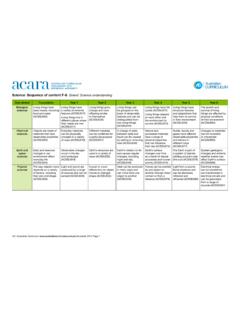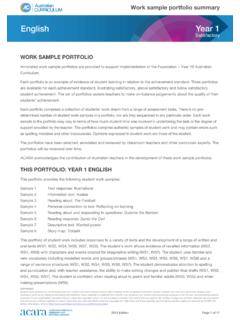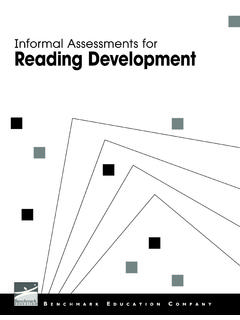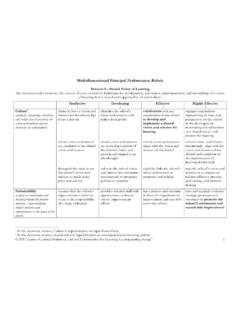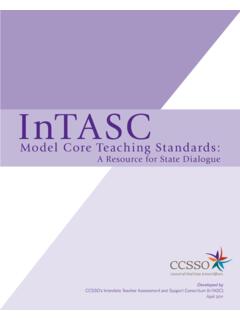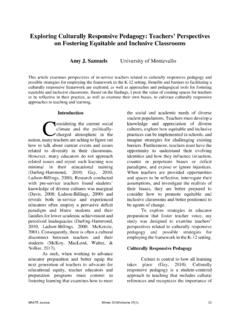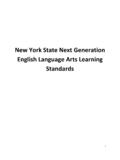Transcription of English as an Additional Language or Dialect Teacher Resource
1 English as an Additional Language or Dialect Teacher Resource EAL/D overview and advice February 2014 Amendment History i All material in this brochure is subject to copyright under the Copyright Act 1968 (Cth) and is owned by the Australian Curriculum, Assessment and Reporting Authority (ACARA) 2013. Licence Unless otherwise noted, all material in this brochure except the logo of ACARA, third party icons and any material protected by trademark is licensed under a Creative Commons Attribution-NonCommercial-ShareAlike Australia (CC BY NC SA) licence identified by the following logo.
2 Under a CC BY NC SA Licence, you may download, copy, print and communicate material for personal or non-commercial purposes, including educational or organisational use, provided you attribute ACARA and licence any new work created incorporating material from this website under the same CC BY NC SA Licence. Attribution (Credit ACARA) All ACARA material licensed under the CC BY NC SA licence must be attributed in the following manner: Unmodified ACARA material: You must credit ACARA in the following manner: Source: Australian Curriculum, Assessment and Reporting Authority (ACARA) Modified ACARA material: You must credit ACARA in the following manner: Based on Australian Curriculum, Assessment and Reporting Authority (ACARA) materials Copyright inquiries For all copyright inquiries, please email: or phone.
3 1300 895 563 (if within Australia) or 61 2 8098 3100 (if outside Australia). Contents English as an Additional Language Teacher Resource : EAL/D Learning Progression Foundation to year 10 Contents ii Contents About the Resource .. 5 EAL/D overview and advice .. 5 Overview .. 6 Who are EAL/D students? .. 6 Considerations for EAL/D students with limited schooling .. 7 English in Australia .. 8 Intercultural understanding .. 8 Characteristics of EAL/D learning .. 9 Learning a new Language .. 10 Assessment and the EAL/D student .. 10 Advice for teachers of EAL/D students.
4 12 Linguistic and cultural factors that affect EAL/D students learning .. 12 Oral Language development for EAL/D students .. 13 Differences between languages and writing systems .. 13 Differences in the ways texts are constructed .. 14 Cohesion in English texts .. 14 Other features of English sentence structure .. 15 English vocabulary for EAL/D students .. 16 Other considerations for teaching EAL/D students .. 18 EAL/D students prior schooling .. 20 Intercultural understanding .. 20 Assumed cultural knowledge .. 21 EAL/D students expectations of schooling .. 21 Teaching strategies to support EAL/D students access the learning in content descriptions.
5 22 Utilising EAL/D students cultural and linguistic resources .. 22 Building shared knowledge .. 23 ContentsContents English as an Additional Language Teacher Resource : EAL/D Learning Progression Foundation to year 10 Contents iii Ensuring pedagogies of entitlement and Language support for EAL/D 24 Considerations relating to EAL/D students and the school learning environment .. 27 References .. 34 State and Territory Resources .. 34 Acknowledgments .. 36 English as an Additional Language Teacher Resource : EAL/D Learning Progression Foundation to year 10 Overview 5 The Shape of the Australian Curriculum describes ACARA s commitment to supporting equity of access to the Australian Curriculum for all students.
6 As part of this commitment, ACARA developed the English as an Additional Language or Dialect Teacher Resource to support teachers as they develop teaching and learning programs in the Australian Curriculum: Foundation to year 10 with students for whom English is an Additional Language or Dialect (EAL/D). The English as an Additional Language or Dialect Teacher Resource is available as several related publications: EAL/D Overview and Advice EAL/D Learning Progression Foundation to year 10 EAL/D Annotated Content Descriptions Foundation to year 10 for each of English , Mathematics, Science and History Student Illustrations of EAL/D Learning Progression Foundation to year 10.
7 Additional components of the Resource will be published as the Australian Curriculum is developed. All publications are available on the Australian Curriculum Website. The Resource has been developed to: advise teachers about areas of the curriculum that EAL/D students may find challenging and why assist classroom teachers to identify where their EAL/D students are broadly positioned on a progression of English Language learning help teachers understand students cultural and linguistic diversity, and the ways this understanding can be used in the classroom provide examples of teaching strategies supportive of EAL/D students direct teachers to Additional relevant and useful support for teaching EAL/D students.
8 Throughout the Resource , English refers to Standard Australian English . EAL/D overview and advice This publication comprises: an overview of the characteristics of students learning EAL/D and their particular needs; advice for teachers regarding linguistic and cultural considerations and teaching strategies; a glossary of terms used in the Resource ; references. About the Resource English as an Additional Language Teacher Resource : EAL/D Learning Progression Foundation to year 10 Overview 6 In Australian schools, learning is accessed through English , and achievement is demonstrated through English .
9 Each area of the curriculum has Language structures and vocabulary particular to its learning domain, and these are best taught in the context in which they are used. All teachers are responsible for teaching the Language and literacy demands of their learning areas. EAL/D students require specific support to build the English Language skills needed to access the general curriculum, in addition to learning area-specific Language structures and vocabulary. This Resource assists teachers to meet those particular learner needs. It draws on but does not take the place of existing state and territory resources which remain important references for more detailed information.
10 It provides an overview for teachers who may not have specialist training in the area of EAL/D or access to specialist EAL/D teachers. Where available, teachers should also use the expertise of specialist EAL/D teachers who can draw on their own resources in collaborative planning. It identifies some of the linguistic and cultural demands in the Australian Curriculum so that teachers will be able to identify likely areas where EAL/D students may need Additional support that will improve their understanding and participation in the curriculum. The Resource also provides guidance for teachers who are teaching EAL/D students who no longer receive specialist EAL/D teaching support but still need assistance to access the Australian Curriculum.


